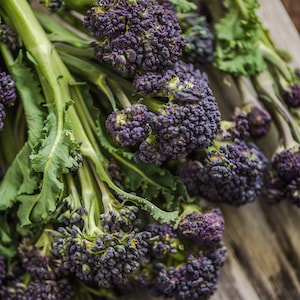What to do in your allotment in February
Written by Lee Senior
Although February can be a cold month, spring isn’t too far around the corner and I’m looking forward to another successful year on our plot. The day length is joyously increasing, and early mornings are filled with the sound of birdsong. There’s noticeably a little more warmth in the sun, and it’s potato chitting time which further increases the excitement! If you haven’t already done so, now is the perfect time to purchase seeds and seed potatoes for your plot.
The ground is still far too cold for any direct seed sowing, however, indoors is a different story. Realistically we do need to curb our enthusiasm a bit though, as winter may still have a sting in its tail! Outdoors, when the land isn’t too wet, or frozen, February can be a good month to begin working on the land and improve the soil structure for spring. Perennial weeds and couch grass are already starting to grow – remove them now before they get too established. But if it’s too wet, stay off the ground or you’ll do more harm than good. Happy growing!
Allotment flowers in February
- Snowdrops and crocus are in flower across the UK and daffodils will follow soon. Spring-flowering bulbs brighten up the allotment early in the year and also play a vital role in attracting pollinating insects to our plots.
- Plug plants offer a great alternative to growing annual flowers from seed if you don’t have space or time to nurture your own.
- Bare root roses can be planted this month if the ground isn’t frozen or waterlogged. Container-grown roses can be planted all year round.
- Sweet peas can be sown this month. Try ‘True Fragrance’ for a super strong scent or ‘Long Stemmed Mix’ for cutting and displaying indoors.
- Pinch out your overwintered sweetpea seedlings.
- Half-hardy annuals such as cosmos ‘Sonata Dwarf Mix’, bedding geraniums and marigold seeds can be sown in gentle heat towards the end of the month. It’s important to offer ongoing frost protection and provide enough heat and light.
- Sow a packet of Seeds for Predators ‘Fantasia Mix’ at your plot. These pretty blooms attract beneficial predators such as hoverflies, and help to keep unwanted pests in check.
- Alyssum ‘Wandering Star Mix’ is another annual predator mix that can be sown now. Attracting ladybirds, it’s a good, fragrant, ground cover plant that also looks great in tubs and baskets too.
- As soon as your early daffodils come into bud, cut a few to enjoy in a vase inside.
Allotment vegetables in February
- If, like me, you grow asparagus from seed, then this is the time of year to start sowing, provided you can supply the minimum requirement of 65F for germination. Alternatively, asparagus crowns are a quick way to establish a new asparagus bed. The Asparagus ‘Gijnlim’ is ideal for high yields throughout spring.
- Early peas can be sown under cover this month. Pea ‘Early Onward’ is an excellent early variety which can be sown under glass or cold frame in February.
- Early broad beans can also be sown under cover. ‘Aquadulce Claudia’ remains my timeless favourite.
- A number of other seeds for long season crops can be sown in February in a heated propagator or on a warm south-facing windowsill. These include aubergine seeds, tomatoes, sweet peppers and chilli seeds.
- Tomatoes are one of my ‘must have’ foods and I’ve tried dozens of varieties over the years. Although not new, ‘F1 Shirley’ takes some beating for reliability and flavour. For cherry tomatoes, ‘Gardener’s Delight’ is still my favourite.
- Plant onion sets into modular seed trays this month to encourage them to start producing strong roots for the season ahead.
- Plant spring garlic bulbs, ready to harvest in autumn.
- First earlies and second early potatoes should be chitting nicely now. Keep an eye on the tubers to make sure the young shoots aren’t becoming too leggy or brittle.
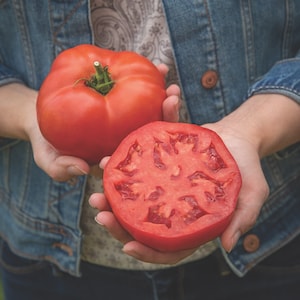
Image: Tomato Seeds – Burlesque F1
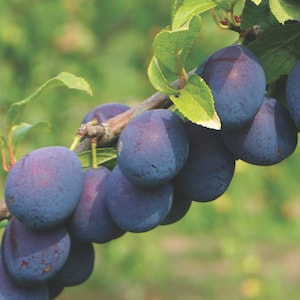
Image: Damson Tree – Merryweather
Allotment fruit in February
- Bare root fruit trees or bushes can be planted out until the end of March. Avoid waterlogged or frozen conditions.
- Add a layer of well-rotted manure or multi-purpose compost around the base of your fruit trees and bushes to give them a boost before growth begins in earnest. It can act as a temporary mulch too, helping to keep moisture in the soil near the roots.
- Prune out any wind-damaged branches on apple and pear trees, to prevent any longer-lasting damage.
- This is a good time of year to prepare a new strawberry plant bed. Eradicate perennial weeds as they’re difficult to remove once the beds become established.
- If your allotment has a dedicated fruit area, a fruit cage is a good idea to prevent birds from stealing your crop.
- Prune the old canes of autumn-fruiting raspberries down to the ground with a sharp pair of secateurs.
- It’s not too late to use a rhubarb forcer, making your first crops extra sweet. Generally, it’s better to discard the forced plants after cropping as the crowns are significantly weakened.
Crops to harvest in February
- Keep harvesting winter vegetables like Brussels sprouts and leeks. I’ve just used the last of my leeks which were delicious stir fried with Brussels Sprouts. My sprouts are still going strong and it’s good practice to harvest them from the bottom up.
- Harvest any early purple sprouting broccoli as the florets appear. My purple sprouting broccoli seems to crop earlier every year. When I was a student in the 90s, the earliest the plants ever cropped was late March. Perhaps this is a sign of the milder winters we often get nowadays.
- Parsnips and swede should still be cropping nicely.
- Jerusalem artichokes are a lovely root to harvest this month. Ultra-dependable and very underrated, they can be harvested from December-March and make a fine temporary hedge in summer, growing over 6ft tall.
- Kale and winter savoy cabbage are also in season.
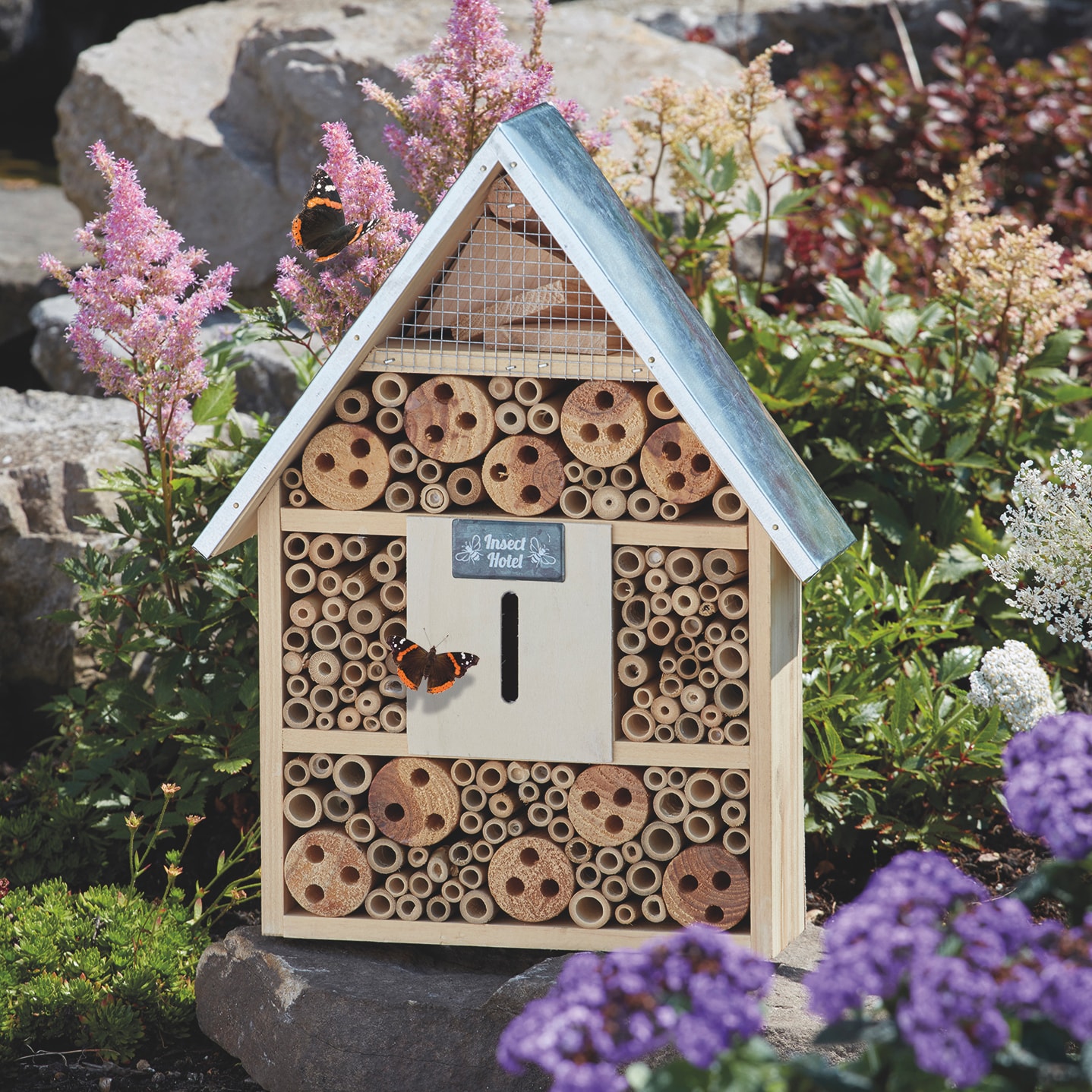
Image: Wooden Insect Hotel
General February allotment jobs
- It pays to warm up the soil in any beds earmarked for the sowing or planting of early crops. Cloches or a straw-based type of mulch can be effective. Alternatively, cover the soil with polythene. This may shift sowing time forward by a few weeks giving you a head start!
- Toward the end of the month, start hardening-off any hardy vegetable plants that have been raised under cover, ready for planting out in March.
- Remove the lower leaves of your sprout plants as they yellow and wither. Keep all brassicas covered with bird proof netting and check this periodically as the wind can dislodge it.
- Clean greenhouse panes to remove algae and allow maximum light to reach your developing seedlings.
- Attract bugs and pollinating insects to the allotment by installing bug houses and growing more flowering plants. Kids love helping to make solitary bee hotels.
- Keep an eye on weeds this month – it’s easier to pull them up when they’re small!
- Stay off the soil if the allotment is waterlogged. Scaffolding planks help to spread your weight and make good pathways when the soil is wet.
Planning ahead
- Order your second early potato varieties for planting in March. My windowsill is now in active use chitting my first early potatoes ‘Foremost’ and the slightly later first early ‘Charlotte’. Use your brightest window and stand the tubers in trays with the eyes pointing upwards. Protect them from too much heat from radiators.
- March is the perfect seed sowing month, so make sure you’ve got your vegetable seeds ordered.
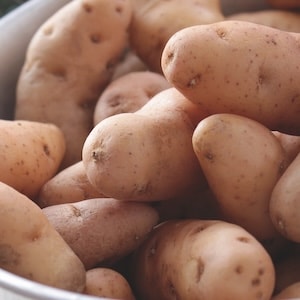
Image: Potato ‘Pink Fir Apple’
Suttons Seeds recommend these areas which may also be of interest.
- Previous month: What to do in your allotment in January
- Next month: What to do in your allotment in March



